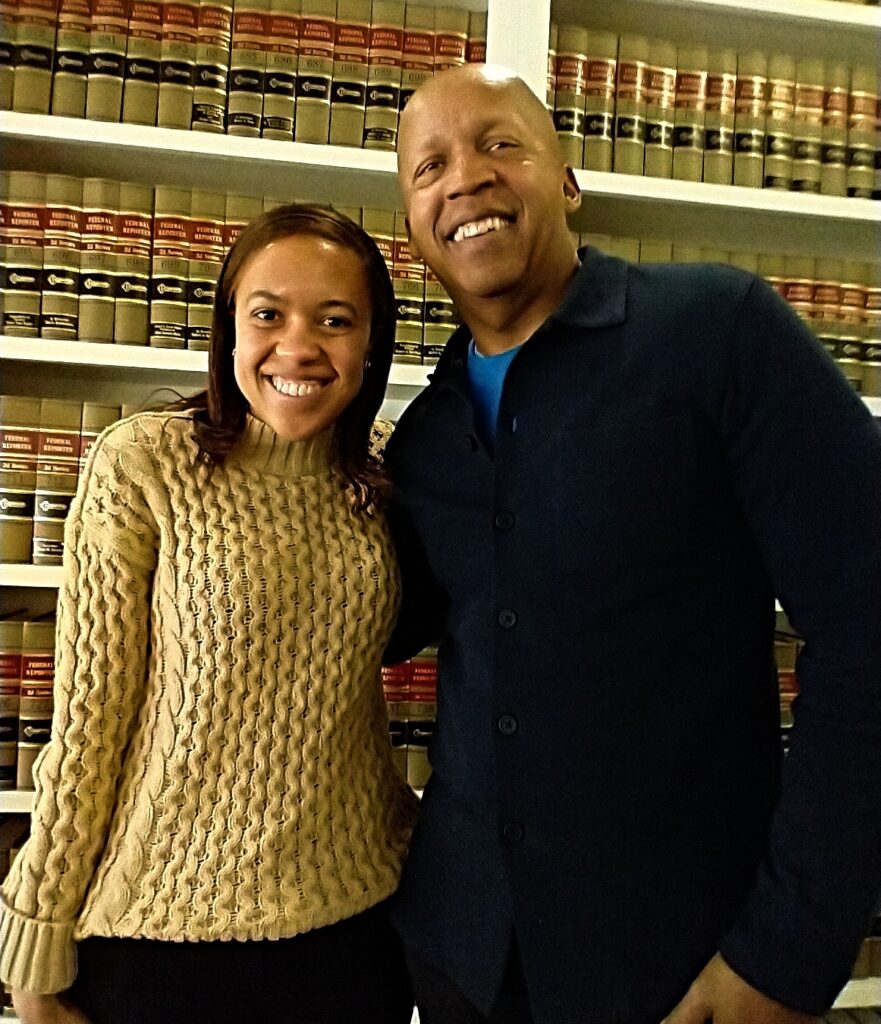What drew you to work with incarcerated people?
My first year of college at UNC-Chapel Hill, our assigned summer reading was Just Mercy by Bryan Stevenson. I had the privilege of meeting Mr. Stevenson when he came to our school and spoke about his work, and he signed my book. The book is about mass incarceration and the death penalty, and how people of color are treated in the system. In the book, Mr. Stevenson also talks about the importance of getting proximate to people who are directly impacted. That’s what led me to volunteer with kids at a juvenile detention center. That’s where I decided I wanted to be an advocate.
I quickly realized that a juvenile detention center is nothing more than a children’s jail. The kids there were locked in, separated from their families, and treated like they should be feared instead of cared for. Rarely did we see white children and almost all of the kids there were Black boys. These were boys who had been let down by the school system, lived in poverty, and had family and friends who’d been shot and killed or died of drug overdoses.
When I first started volunteering, I was 18, so I was close in age to many of the kids there. I realized that if my life had taken a different direction, or if I hadn’t had a supportive family, I could’ve been right where they were. When I graduated, I knew I wanted to become a defense attorney and help tell the stories of people who had been pushed away from society. From undergrad, I went straight to Duke Law so I could become a criminal defense attorney.
Why do you want to represent people who are guilty and have committed crimes as serious as murder?
You’re right that CDPL is not an innocence project. We represent people on death row and while some of our clients are innocent, we also represent people who are, in fact, guilty. For me, the way we treat people who have caused great harm is a deeply moral issue. As Bryan Stevenson says, we’re all more than the worst thing we’ve ever done, and if that is true, then we have to treat all people with dignity and respect no matter what they’ve done. We have to treat them with empathy and compassion. The death penalty is the exact opposite of that.
It’s also true that our society does not punish everyone who has caused great harm the same way. A lot of times, we punish people differently based on the color of their skin. As a society, we are much more likely to decide that a person of color, especially a Black man, is irredeemable. I completely disagree with the idea that some people are irredeemable and some people aren’t.
What’s the most challenging part of being a capital defense attorney?
As a criminal defense attorney, you’re always going to be the underdog. When going into a courtroom, you’re taking on the challenge of not just arguing a legal claim, but arguing for your client’s humanity. It can be challenging when people are sometimes so blinded by their preconceived notions that it’s impossible to get them to even consider the possibility that your client isn’t a monster. For me, it’s been disappointing to see people who claim they care about justice, but their justice has no space for people of color who have been accused of crimes. It has no space for people who struggle with poverty, who have mental illness, who have been let down by the system.
What would you like people to know about your clients?
They are some of the kindest, funniest, most loving, thoughtful people. Some of their stories are so harrowing to hear, the poverty and abuse they’ve lived through, the addiction. But then I see how different they are today, and I enjoy being with them. If more people could meet them, they would see what I see. These are not people who deserve to be executed.
Of the work you’ve done so far, what are you most proud of?
In 2024, I was counsel on the historic Racial Justice Act case, which discussed the racism in the capital punishment system. I was proud to be part of the team of attorneys representing Mr. Hasson Bacote in such a landmark case. Bryan Stevenson was our expert witness, and I went down to his nonprofit, the Equal Justice Initiative in Alabama, to help prepare him for his testimony. It was such a full circle moment for me to work with someone who had inspired me to go to law school. I’m going to cherish that for the rest of my life.

